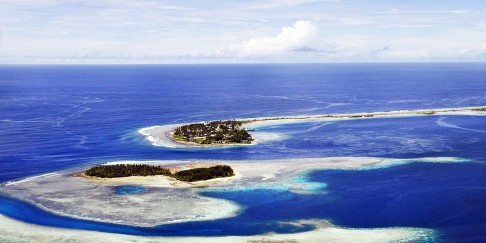May 14:
Source: http://www.scmp.com/news/world/article/1797398/marshall-islands-weigh-advantages-oil-related-revenue-against-effects?
The Marshall Islands, the world's third-largest shipping registry, may stop registering oil rigs, according to the Pacific nation's foreign minister Tony de Brum.
De Brum has advocated on the international stage for the survival of his islands, which are already suffering the effects of climate change. But he admitted that the 183 drill ships and platforms that sail under the Marshallese ensign were an uncomfortable reality as one of the tiny nation's main sources of income.
"We are aware of oil companies financing platforms that are registered by our ship's registry," he said. "We were very rudely awakened to this fact by the Deepwater Horizon issue in the Gulf [of Mexico] and in recent times by Greenpeace trying to mount our Marshallese-registered platform."
In April, six activists climbed aboard a Shell-operated rig bound for the Arctic to start its drilling programme in the far north. Greenpeace called on the Marshall Islands to cease registering the vehicles of extraction.
De Brum said his government may consider rejecting oil rig registrations, but the act would be useless in isolation and would only damage a business worth US$5 million each year, or about 2.5 per cent of the country's GDP.
"That may very well be a political decision made by our cabinet, that we will no longer register oil rigs," he said. "If that's the case we want to make sure that they don't just go register elsewhere and do the same thing. This exercise should have some positive result and the best way to do that is get everybody involved.
"While we are in agreement that there must be divestment, we have to take into account the dependence of the country on the amount we earn from our ship registry. And the fact that, if we drop a platform, it merely goes on to Panama or Nigeria."
On Monday, the US decided to allow Shell's Marshallese-registered oil rig to proceed with drilling in Arctic waters. De Brum said the decision was inconsistent with US President Barack Obama's proactive rhetoric on climate change.
"It's not easy when the United States is our main development partner and our closest ally and they are talking about keeping it in the ground and issuing permits for people to go dig it up," De Brum said.
De Brum was in London on Wednesday to lobby the International Maritime Organisation to set carbon emissions targets for the shipping industry. He said an international agreement was the only way to control a massive source of greenhouse gases that remained exempt from mainstream climate talks and to coordinate flag states to block the registration of the most polluting vessels. Shipping causes about 3 per cent of annual global emissions, about the same as aviation.
Source: http://www.scmp.com/news/world/article/1797398/marshall-islands-weigh-advantages-oil-related-revenue-against-effects?

Comments
Post a Comment